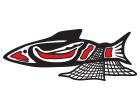Head Start
Overview
Nisqually Tribe Head Start is a federal program that promotes the school readiness of children from birth to age five from low-income families by providing comprehensive early childhood educational services to enhance children’s cognitive, social, and emotional development. Head Start is a child-focused program, and haves an overall goal of increasing the social competence of young children from low-income families. Nisqually Tribe Head Start has a long tradition of delivering high quality services designed to foster healthy development of all our children who attend the program. The program provides a learning environment that supports children's growth in many areas such as language, literacy, and social and emotional development, and provides a range of individualized services in the areas of education, medical, dental, mental health, nutrition and parent engagement.
Our mission is to “offer a place of support for our children and families by empowering the families to become further involved in the education of their children. Early/Head Start provides educational opportunities necessary to nurture and develop positive self-esteem and greater competency amongst our families as they move forward in life.”
Early Head Start
Nisqually Tribe also provides Early Head Start (EHS), which serves infants and toddlers, and their families who have incomes below the Federal poverty level. The Nisqually Tribe EHS program is a federally funded program that provides intensive comprehensive child development and family support services to low-income infants and toddlers and their families. Early Head Start is designed to nurture healthy attachments between parent and child (and child and caregiver). Services encompass the full range of a family's needs from birth through the child's third birthday. The program offers:
- Early intervention for infants and toddlers with delays or medical diagnoses
- Developmental support for infants and toddlers
- Comprehensive Educational services
- Ages & Stages Assessment, and referrals
- Parental and family support and involvement
- Referrals for social services
- Health, dental, nutrition, mental health, and social services
- Home visits
- Transition planning
The attachments below require a PDF viewer. Click here to download Adobe Reader for free.
